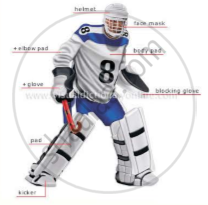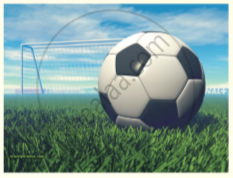Advertisements
Advertisements
प्रश्न
Reporting verbs
Did you know?
Sometimes it is not necessary to report everything that is said word for word. It may be better to use “reporting verbs” which summarise what was communicated. Below are some of the most commonly used verbs of this kind.
| accept | advice | apologise | ask | assure | blame |
| complain | compliment | congratulate | explain | greet | hope |
| introduce | invite | offer | order | persuade | promise |
| refuse | regret | remind | say | suggest | tell |
| sympathise | thank | threaten | answer | warn | encourage |
|
can you hear me? (speaker) |
what did she say? (you) | she asked if you could hear her? (friend) (ask) |
| you should go to the doctor now? (speaker) | what did he say? (you) | he advice you to go to the doctor now? (friend) (advice) |
उत्तर
For self attempt
APPEARS IN
संबंधित प्रश्न
Form pairs - one student will read the text for 'Hockey', and the second student will read the text for 'Football'.
Hockey

The game starts when the umpire blows his whistle for the opening pass-back. The passback is made at the centre of the field to start the game (also after half- time and after each goal is scored). The ball, which may be pushed or hit, must not be directed over the centre line. All players of the opposing team must stand at least 5 yard from the ball and all players of both teams, other than the player making the pass-back must be in their own half of the field.
There are two umpires to control the game and to administer the rules. These umpires are the sole judges of the game. The umpires are responsible for keeping time for the duration of the game.


In front of each goal is an area known as the penalty area. This is a rectangular area, 40.2m wide and extending 16. Sm into the field where the goalkeeper operates.
A standard adult football match consists of two periods of 45 minutes each, known as halves. Each half runs continuously, meaning that the clock is not stopped when the ball is out of play. There is usually a 15-minute half-time break between halves. The end of the match is known as full-time. Anytime during the match, a team can substitute upto three players maximum.
The game is controlled by a referee who is the official timekeeper for the match, and may make an allowance for time lost through substitutions, injured players requiring attention, or other stoppages. There are also two linesmen who keep guard of the touchlines or sidelines, signalling when the ball crosses the boundary lines. The referee alone signals the end of the match.
Handling the ball deliberately, pushing or tripping an opponent, or hitting a player from behind are examples of fouls, punishable by a direct free kick or penalty kick depending on where the offence occurred. Other fouls are punishable by an indirect free kick.
The referee may punish a player's or substitute's misconduct by a caution (yellow card) or sending-off (red card). A player is given a yellow card is said to have been 'booked'.
• Red - Serious misconduct resulting in ejection from the game. If a player has been sent off, no substitute can be brought in his place.
Exceeding peace had made Ben Adhem bold,
And to the presence in the room he said,
"What writest thou?"..... The vision raised its head,
And with a look made of all sweet accord,
Answered, "The names of those who love the Lord."
Read the lines given above and answer the following question.
What did the angel tell Abou bin Adhem?
To us the ashes of our ancestors are sacred and their resting place is hallowed ground. You wander far from the graves of your ancestors and seemingly without regret. Your religion was written upon tablets of stone by the iron finger of your God so that you could not forget. The Red Man could never comprehend or remember it. Our religion is the traditions of our ancestors — the dreams of our old men, given them in solemn hours of the night by the Great Spirit; and the visions of our sachems, and is written in the hearts of our people.
Day and night cannot dwell together. The Red Man has ever fled the approach of the White Man, as the morning mist flees before the morning sun. However, your proposition seems fair and I think that my people will accept it and will retire to the reservation you offer them. Then we will dwell apart in peace, for the words of the Great White Chief seem to be the words of nature speaking to my people out of dense darkness.
Read the extract given below and answer the question that follow.
How do the tribal men regard the ashes of their ancestors?
Joe did not see the Guardians of the Poor on that day, on the next, nor on the day following. In fact, he never saw them at all on Maggie’s account, for in less than a week Mrs. Joe Thompson would as soon leave thought of taking up her own abode in the almshouse as sending Maggie there.
What light and blessing did that sick and helpless child bring to the home of Joe Thompson, the poor wheelwright! It had been dark, and cold, and miserable there for a long time just because his wife had nothing to love and care for out of herself, and so became soar, irritable, ill-tempered, and self-afflicting in the desolation of her woman’s nature. Now the sweetness of that sick child, looking ever to her in love, patience, and gratitude, was as honey to her soul, and she carried her in her heart as well as in her arms, a precious burden. As for Joe Thompson, there was not a man in all the neighbourhood who drank daily of a more precious wine of life than he. An angel had come into his house, disguised as a sick, helpless, and miserable child, and filled all its dreary chambers with the sunshine of love.
Read the extract given below and answer the question that follow.
What changed her ? Describe the change in her.
Read the extract given below and answer the questions that follow :
Bassanio: A gentle scroll. - Fair lady, by your leave; (Kissing her)
I come by not, to give and to receive.
Like one of two contending in a prize,
That thinks he hath done well in people's eyes
Hearing applause and universal shout
Giddy in spirit, still gazing, in a doubt
Whether those peals of praise be his or no;
(i) Where did Bassanio find the 'gentle scroll'? What 'prize' had Bassanio just won?
(ii) Explain why Basscmio said he felt 'Giddy in spirit, still gazing, in a doubt'.
(iii) Shortly after this exchange, Port: it gave Bassanio a ring as a token of her affection. What did the gift symbolize?
(iv) What assurance did Bassanio give her when he accepted the ring?
(v) What did Portia urge Bassanio to do when she learned that his friend Antonio was in trouble? What aspect of her character is revealed through her words?
Why did the king want to know answers to three questions?
- What steps did he take to save himself?
- Did his plan work? How?
Complete the following sentences from memory choosing a phrase from those given in brackets.
Uncle told me ______ while he was away.
Comment on the speaker’s resolve to go inside the shed.
Complete the following sentence by providing a reason:
In the poem, Dover Beach, the poet wants his beloved to be "true" to him because ______.
